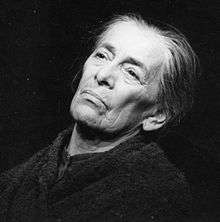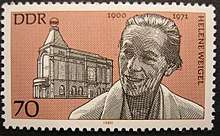Helene Weigel
Helene Weigel (German: [heˈleː.nə ˈvaɪ̯gl̩] (![]()
Helene Weigel | |
|---|---|
 Weigel in 1967, as "Mother" in Bertolt Brecht's play The Mother | |
| Born | Helene Weigel 12 May 1900 |
| Died | 6 May 1971 (aged 70) |
| Occupation |
|
| Spouse(s) | Bertolt Brecht |
| Children | 2 |

Personal life
Weigel was born in Vienna, Austria-Hungary, the daughter of Leopoldine (née Pollak) and Siegfried Weigel, an accountant-general in a textile factory[1]. Her family was Jewish.[1] She and husband Brecht had two children, Stefan Brecht and Barbara Brecht-Schall. Weigel was a Communist Party member from 1930.[1]
Career
Weigel became the artistic director of the Berliner Ensemble after Brecht's death in 1956. She is most noted for creating several Brecht roles, including: Pelagea Vlassova, The Mother of 1932; Antigone in Brecht's version of the Greek tragedy; the title role in his civil war play, Señora Carrar's Rifles; and the iconic Mother Courage.
Between 1933 and 1947, as a refugee from Adolf Hitler's Germany, she was seldom able to pursue her acting craft, even during the family's six-year stay in Los Angeles. It was only with the foundation of the Berliner Ensemble in East Germany in 1949 that Brecht's theatre began to be recognised worldwide. She died in 1971, still at the helm of the company, and many of the roles that she created with Brecht are still in the theatre's repertoire today.
Death
Weigel died in East Berlin on 6 May 1971, six days before her 71st birthday[1].
References
- "Helene Weigel | Jewish Women's Archive". Jwa.org. Retrieved 1 January 2013.
- "Helene Weigel". BFI.
Notable understudies
- Ingrid Pitt, British-Polish actress
External links
| Wikimedia Commons has media related to Helene Weigel. |
- Berliner Ensemble
- Jennifer Marston Willia, Biography of Helene Weigel, Jewish Women Encyclopedia
- Helene Weigel on IMDb